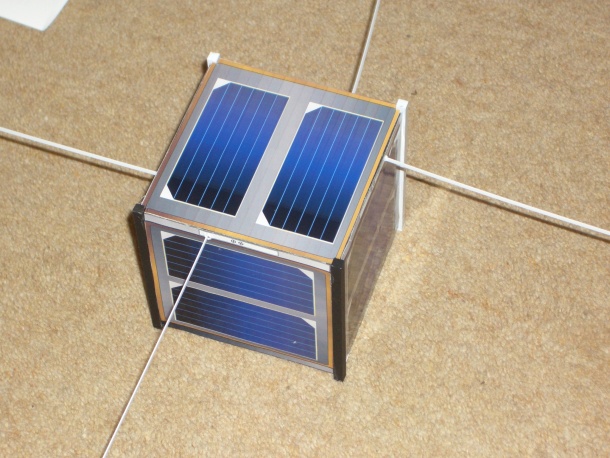Radio amateurs prep launch of tiny FUNcube satellite

A group of British radio hams will send a tiny 10cm-cubed satellite into space later this year, part of a project to boost young people's interest in science and technology.

The FUNcube satellite will be launched later in 2012. Above: a model of the 10cm cube. Photo credit: FUNcube
AMSAT-UK will load its FUNcube-1 CubeSat picosatellite onto a converted intercontinental ballistic missile (ICBM) that is set for take-off in the third quarter of 2012, the radio-amateur organisation said on Wednesday. Once
in orbit, the spacecraft will use a 145MHz telemetry beacon to transmit signals for schools and colleges to analyse.
"They will be able to receive the data stream which contains telemetry — things like battery voltages and solar panel currents — and from this they'll be able to deduce things like the spin rate of the satellite, and what happens to temperatures when it goes into or out of eclipse," FUNcube project lead Jim Heck told ZDNet UK.
The students will also be able to send, via a moderator, 'Fitter' (as in 'FUNcube Twitter') messages of 200 characters to the CubeSat. The spacecraft will then be able to broadcast these messages back to other users, according to Heck.
To receive signals from FUNcube-1, people must use a £120 software-defined
radio (SDR) dongle, which acts as a ground station. Although the FUNcube scheme is UK-based, Heck pointed out that its signals will be available globally.
"In addition to providing educational outreach for schools and colleges around the world, the spacecraft will... provide a U/V linear transponder for radio amateurs during local 'night', at weekends and during holiday periods," AMSAT-UK said in a statement.
FUNcube-1 will go up on a DNEPR rocket, one of a batch of old ICBMs that are being converted to take satellites into space. It will take off from the Yasny launch facility in southern Russia, in a launch organised through the Netherlands' ISIS Launch Services.
According to AMSAT-UK, the precise orbit of the spacecraft is yet to be determined. However, the group said it will be "nearly circular" and mostly sun-synchronous, so the largely solar-powered device will be illuminated almost all the time.
There are some precedents for education-oriented satellites, notably ARISSAT-1. That amateur radio satellite has been in space for around three months and is expected to burn up in the next few days. However, Heck said the AMSAT-UK team hopes the FUNcube-1 will stay aloft for years.
"We're hoping ours will have a much longer lifetime," Heck said, suggesting FUNcube-1 will last for between two and eight years. The longevity of the device is down to how long its batteries provide charge, and how severe the radiation damage to various electronic components turns out to be, he said.
The FUNcube-1 spacecraft itself is already fully funded, but AMSAT-UK is asking for donations to pay for its launch. The group has set up a page for people who want to give money.
Get the latest technology news and analysis, blogs and reviews delivered directly to your inbox with ZDNet UK's newsletters.